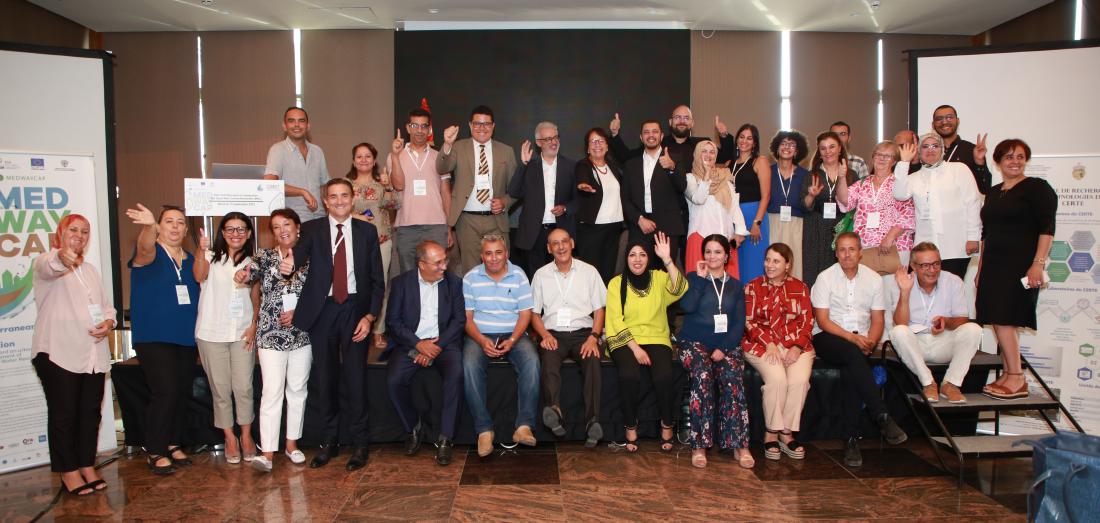MEDWAYCAP: A National Action Plan for the valorisation of Non-Conventional Water drawn up in Tunisia

Following a first workshop & B2B that brought together the main players and initiatives in the field of non-conventional waters (NCW) and based on the capitalization of present expertise, while integrating the current eco-system and the legal and institutional context, an Action Plan for the valorization of non-conventional water (NCW Action Plan) has been developed by the team of the Centre for Water Research and Technologies (CERTE) and its associate partner CONECT, with the support of “Alghalia Technology and Development” in the framework of the MEDWAYCAP project.
Another Workshop entitled "Action Plan for the Valorisation of NCW" was organized where the action plan was carefully studied, discussed, commented and completed by all participants.

The Action Plan is divided into three categories: (i) Market development prospects, (ii) Promotion of solutions/BPs for adding value to NCW, (iii) Regulatory framework and access to finance. Each of these themes includes a set of actions, specifying the key players, the time required for implementation and the expected impact. At the end of the workshop, a co-constructed action plan will be adopted, to which each of the participants/actors will contribute through his or her professional activities and capabilities, network and partnership, and which will constitute a guideline document for stakeholders and decision-makers. The NCW Action plan is in line with the water strategies as Water2050 and REUT2050.
In order to boost its implementation, an information, dissemination and lobbying action will be carried out following the initiative of CERTE and CONECT, through a signed Memorandum of Understanding (MoU) to support the constitution of a professional group for Non-Conventional Water (GPENC) within CONECT, with the aim of promoting and considering the NCW ACTION PLAN as a roadmap.
The NCW ACTION PLAN is available via this link.

There were several responses to the question of what urgent action should be taken to initiate change. Mr Chekib Ben Mustapha called for a comprehensive programme for NCW, similar to that for solar energy, to encourage widespread adoption and implementation. For Prof. Ghrabi, it's necessary to start harnessing rainwater, where there is a wealth of ancient and new knowledge. For Mr. Adel Ben Taeib, making grey water available in cities will enable urban agriculture and green transformation. According to Mr. Heithem Ben Salem, mobilising funds for NCW is the most urgent action. For Prof. Hakim Gabtni, the real valorisation of treated municipal wastewater in agriculture remains a priority. Mr. Zakaria Hamid underlined the urgency of cooperating within the framework of a cluster dedicated to NCWs, involving all actors in the chain up to valorisation.
Watch the expert interviews on what urgent action is needed to initiate change.
The workshop was held in Tunis on 19 September 2023. It was attended by representatives of ministries (Environment, Agriculture, Equipment, Economy & Planning), public agencies (AUGT, APII, ONAS, INNORPI), research and development institutions (CERTE, ANPR, TBC), architects (Alea Olea, BETA Design), consultancies (SCET-Tunisie, YLA consulting), associations (CONECT), international donors (KFW, ATD, ACSAD, Déléguation générale Wallonie Bruxelles, AICS,), the Municipality of Tunis, companies (Agua de Sol Tunisie, SCAST). The workshop was opened by Prof. Hakim Gabtni, director of CERTE, Mr. Chekib Ben Mustapha, representative and member of the board of CONECT, and Prof. Latifa Bousselmi, national coordinator of the MEDWAYCAP project. The workshop was moderated by Prof. Ahmed Ghrabi (water expert).









